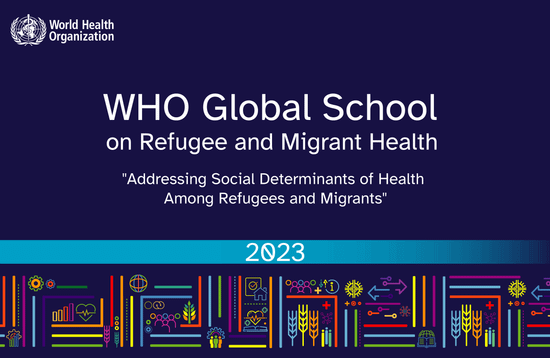
The WHO Department of Health and Migration aims to promote knowledge sharing, build on existing capacities and stimulate a research agenda on health and migration. The Department of Health and Migration organizes the yearly Global School on Refugee and Migrant Health with the aim of supporting countries and territories to build competency on the public health aspects of migration and to promote the development and dissemination of knowledge, attitude and practices based on the exchange of experiences and evidence.
This course consists of video recordings from the 2023 School, which focuses on addressing the social determinants of health among refugees and migrants.
Langue: English
Not disease specific
Informations sur le cours
Overview
The primary aim of the yearly Global School on Refugee and Migrant Health is to contribute to promoting health among migrants, refugees, and their host populations. Each year, the Global School programme is developed around an overarching thematic area, built by merging and exchanging country knowledge and experiences in close collaboration with WHO regional offices, WHO country offices and governments.
This course was developed from previous recording sessions held during 2023. Technical content is delivered innovatively through video reportages, presentations and panel discussions with engagement of international experts, representatives from WHO and other United Nations agencies, and field actors from different regions and disciplines relevant to the area of health and migration.
Please access the Health and Migration Programme (who.int) page for further information and resources.
Course duration
10 hours
Certificates
A Certificate of Achievement will be available to participants who score at least 80% in the final assessment.
Participants who receive a Certificate of Achievement can also download an Open Badge for this course. Click here to learn how.
Ce que vous apprendrez
- Promote evidence-informed and best-practice interventions to address refugee and migrant health needs and rights.
- To provide an opportunity for sharing knowledge, experience and good practice from the ground.
- To strengthen understanding and knowledge to manage health systems and public health aspects of refugee and migrant health.
À qui s'adresse ce cours
- The School is open to everyone, but the main target audience is health sector and government officials, health sector managers, health- and non-health-sector policy-makers, public health experts, and representatives of international organizations and NGOs.
Contenu du cours
Course introduction
Module 1 – Introducing the social determinants of health, focusing on health literacy as a key enabler:
This module will provide an overview on the concept of social determinants of health, its evolution, and how the many circumstances surrounding migration can influence the impact of the social determinants of health.Module 2 – Working conditions:
This module will discuss the impact of precarious working conditions on the health of refugees and migrants.Module 3 – Housing and living conditions:
This module provides an overview of the impact of housing and living conditions on the health of refugees and migrants.Module 4 – Food and nutrition:
This module will explore the causes and the health impacts of food insecurity for refugees and migrants.Module 5 – Addressing social determinants of health among refugees and migrants:
This module will discuss the complex challenge of developing policy and governance inclusive of the health needs and rights of refugees and migrants.Final assessment:
There are 6 questions in this quiz-based assessment. The questions are a recap of the content covered in Modules 1 to 5. You must score 80% to pass.Course close
Inscrivez-moi à ce cours
Certificate Requirements
- Obtenez un certificat de réussite en gagnant plus de 80% du nombre maximal de points pour la somme de toutes les tâches hebdomadaires.